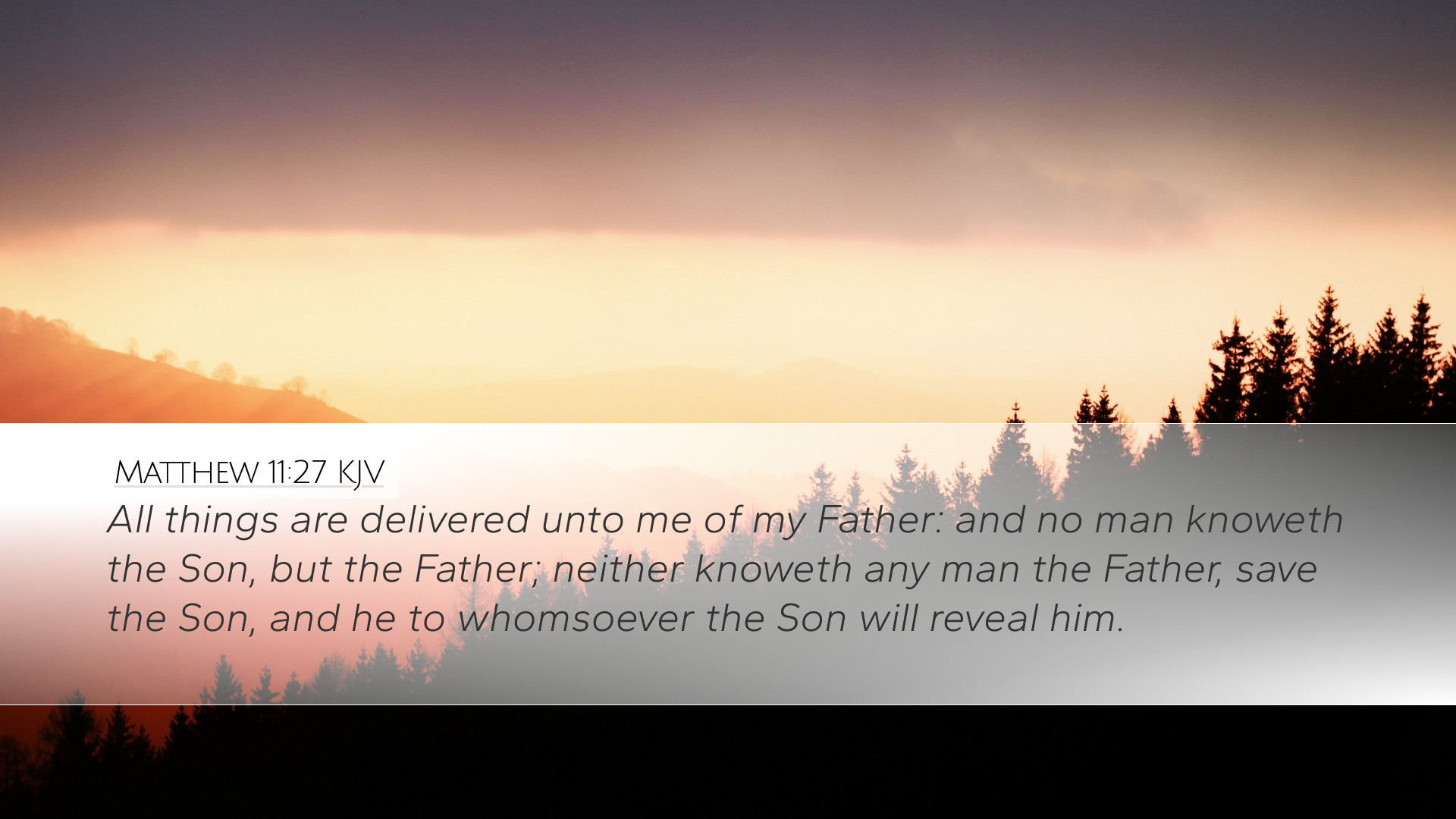Commentary on Matthew 11:27
Matthew 11:27 states: "All things are delivered unto me of my Father: and no man knoweth the Son, but the Father; neither knoweth any man the Father, save the Son, and he to whomsoever the Son will reveal him."
Introduction
This profound verse encapsulates the relationship between the Father and the Son, shedding light on essential themes of divine revelation and Christ's authority. The insights provided by renowned biblical scholars such as Matthew Henry, Albert Barnes, and Adam Clarke offer valuable perspectives that enhance our understanding of this text.
Divine Authority and Revelation
Matthew Henry emphasizes the concept of divine authority in this verse, noting that all things have been delivered to Jesus by the Father. This delivery signifies that Jesus holds supreme authority over all creation, reflecting God's sovereignty. Henry further articulates that this arrangement signifies Jesus as the ultimate mediator between God and humankind, underscoring his unique role in salvation.
Albert Barnes echoes this sentiment, discussing the implications of Christ's dominion. He points out that to know the Father is to really understand the nature and character of God, something achieved only through a relationship with the Son. Barnes further reinforces that the relationship entreated in this passage reveals the exclusivity of divine knowledge and understanding, whereby Jesus is both the revealer and the revealed.
Knowledge of the Father and the Son
Adam Clarke provides an important insight regarding the epistemological aspect presented in this text, noting that mere human understanding cannot grasp the essence of God without divine intervention. Clarke stresses the intimate connection between the Father and the Son, illustrating that true knowledge of God comes not from self-derived reasoning but through the revelation provided by Christ. This aspect is crucial for theological reflection, as it asserts the necessity of revelation through Christ for genuine understanding of God.
The assertion that "no man knoweth the Son, but the Father" highlights the unique relationship they share. This reality should compel believers to seek a deeper relationship with Christ, who alone provides insight into God's nature, establishing him as the only pathway to understanding divine truths.
Implications for Believers
This verse has profound implications for believers and theologians alike. The exclusivity of knowing God through the Son emphasizes the importance of Christ in Christian faith and doctrine. Matthew Henry notes that understanding this truth can lead believers to a more profound appreciation of Christ's teachings and his role as Redeemer.
Albert Barnes further illustrates this by asserting that the knowledge and relationship believers have with the Father are contingent upon their relationship with Christ. Therefore, the fundamental basis for any theological framework must center around the teachings and person of Jesus Christ. This alignment directs both personal faith and communal worship towards Christ, facilitating a deeper exploration of God’s character.
Moreover, Adam Clarke would argue that such exclusivity fosters a sense of reverence and worship within the community of believers. By recognizing Christ as the sole gateway to understanding and relating to God, congregants are encouraged to approach worship with a profound sense of humility and reverence, acknowledging the necessity of grace in unveiling divine realities.
Practical Applications
For pastors and ministers, this passage serves as a reminder of the necessity of pointing congregants towards Christ. Matthew Henry advises that teaching should always lead to a deeper understanding of, and relationship with, Jesus, as he is the ultimate source of wisdom from the Father.
- Encouraging Personal Study: Pastors can encourage personal study of the life and teachings of Christ to foster individual growth in knowing the Father.
- Highlighting Christ-Centered Worship: Worship services should be designed to reflect the teaching that all knowledge of God centers around the revelation of Christ.
- Discipleship Programs: Implement programs focusing on Biblical teachings that emphasize the unique relationship of the Father and Son.
Albert Barnes further encourages believers to engage in intimate prayer, recognizing the relational nature of their existence in Christ. This interaction serves both as a personal invitation and a communal call to deeper knowledge.
Adam Clarke reiterates that through meditation on this scripture, believers can grow in their understanding and relationship with the divine. This growth encourages a continuous journey of faith, marked by revelation and growth in a Christ-centered understanding of God.
Conclusion
Matthew 11:27 serves as a pivotal piece of scripture that underscores the significance of Christ's authority and the exclusive nature of divine revelation. The insights drawn from Matthew Henry, Albert Barnes, and Adam Clarke illuminate the essential nature of the relationship between the Father and the Son and provide believers with a framework for understanding and knowing God. For pastors, students, and theologians, grappling with the depth of this verse invites a lifetime of exploration, reverence, and commitment to the person and work of Jesus Christ.


